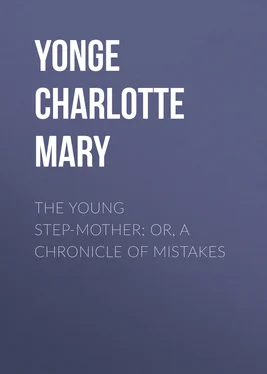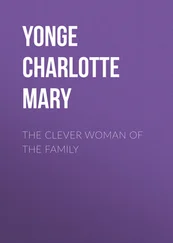Charlotte Yonge - The Young Step-Mother; Or, A Chronicle of Mistakes
Здесь есть возможность читать онлайн «Charlotte Yonge - The Young Step-Mother; Or, A Chronicle of Mistakes» — ознакомительный отрывок электронной книги совершенно бесплатно, а после прочтения отрывка купить полную версию. В некоторых случаях можно слушать аудио, скачать через торрент в формате fb2 и присутствует краткое содержание. Жанр: foreign_prose, literature_19, Европейская старинная литература, foreign_antique, на английском языке. Описание произведения, (предисловие) а так же отзывы посетителей доступны на портале библиотеки ЛибКат.
- Название:The Young Step-Mother; Or, A Chronicle of Mistakes
- Автор:
- Жанр:
- Год:неизвестен
- ISBN:нет данных
- Рейтинг книги:4 / 5. Голосов: 1
-
Избранное:Добавить в избранное
- Отзывы:
-
Ваша оценка:
- 80
- 1
- 2
- 3
- 4
- 5
The Young Step-Mother; Or, A Chronicle of Mistakes: краткое содержание, описание и аннотация
Предлагаем к чтению аннотацию, описание, краткое содержание или предисловие (зависит от того, что написал сам автор книги «The Young Step-Mother; Or, A Chronicle of Mistakes»). Если вы не нашли необходимую информацию о книге — напишите в комментариях, мы постараемся отыскать её.
The Young Step-Mother; Or, A Chronicle of Mistakes — читать онлайн ознакомительный отрывок
Ниже представлен текст книги, разбитый по страницам. Система сохранения места последней прочитанной страницы, позволяет с удобством читать онлайн бесплатно книгу «The Young Step-Mother; Or, A Chronicle of Mistakes», без необходимости каждый раз заново искать на чём Вы остановились. Поставьте закладку, и сможете в любой момент перейти на страницу, на которой закончили чтение.
Интервал:
Закладка:
On coming down they found that Mrs. Dusautoy had dismissed her class, and come out to a low, long-backed sloping garden-seat at the window. She was very little and slight, a mere doll in proportion to her great husband, who could lift her as easily and tenderly as a baby, paying her a sort of reverential deference and fond admiration that rendered them a beautiful sight, in such full, redoubled measure was his fondness repaid by the little, clever, fairy-looking woman, with her playful manner, high spirits, keen wit, and the active habits that even confirmed invalidism could not destroy. She had small deadly white hands, a fair complexion, that varied more than was good for her, pretty, though rather sharp and irregular features, and hazel eyes dancing with merriment, and face and figure at some years above thirty, would have suited a girl of twenty. To see Mr. Dusautoy bringing her footstools, shawls, and cushions, and to remember the accusation of starvation, was almost irresistibly ludicrous.
‘Now, John, you had better have been giving Mrs. Kendal a chair all this time.’
‘Mrs. Kendal will excuse,’ said Mr. Dusautoy, as he brought her a seat.
‘Mrs. Kendal has excused,’ said Mrs. Dusautoy, bursting into a merry fit of laughter. ‘Oh, I never heard anything more charming than your introduction! I beg your pardon, but I laughed last evening till I was worn out, and waked in the night laughing again.’
It was exhilarating to find that any one laughed at Bayford, and Albinia partook of the mirth with all her heart. ‘Never was an address more gratifying to me!’ she said.
‘It was like him! so unlike Bayford! So bold a venture!’ continued Mrs. Dusautoy amid peals of laughter.
‘What is there to laugh at?’ said Mr. Dusautoy, putting on a look between merriment and simplicity. ‘What else could I have done? I should have done the same whoever I had met.’
‘Ah! now he is afraid of your taking it as too great a compliment! To do him justice I believe he would, but the question is, what answer he would have had.’
‘Nobody could have refused—’ began Albinia.
‘Oh!’ cried Mrs. Dusautoy. ‘Little you know Bayford.
‘Fanny! Fanny! this is too bad. Madame Belmarche—’
‘Would have had nothing but eau sucre! No, John, decidedly you and Simkins fell upon your legs, and you had better take credit for your “admirable sagacity.”’.
‘I like the people,’ said Albinia, ‘but they never can be well while they live in such a shocking place. It is quite a disgrace to Bayford.’
‘It is in a sad state,’ said Mr. Dusautoy.
‘I know I should like to set my brother upon that Mr. Pettilove, who they say will do nothing,’ exclaimed Albinia.
The Vicar was going to have said something, but a look from his wife checked him. Albinia was sorry for it, as she detected a look of suppressed amusement on Mrs. Dusautoy’s face. ‘I mean to ask Mr. Kendal what can be done,’ she said; ‘and in the meantime, to descend from what we can’t do to what we can. Mr. Dusautoy told me to come to you for orders.’
‘And I told Mr. Dusautoy that I should give you none.’
‘Oh! that is hard.’
‘If you could have heard him! He thought he had got a working lady at last, and he would have had no mercy upon you. One would have imagined that Mr. Kendal had brought you here for his sole behoof!’
‘Then I shall look to you, Mr. Dusautoy.’
‘No, I believe she is quite right,’ he said. ‘She says you ought to undertake nothing till you have had time to see what leisure you have to give us.’
‘Nay, I have been used to think the parish my business, home my leisure.’
‘Yes,’ said Mrs. Dusautoy, ‘but then you were the womankind of the clergy, now you are a laywoman.’
‘I think you have work at home,’ said the Vicar.
‘Work, but not work enough! ’ cried Albinia. ‘The girls will help me; only tell me what I may do.’
‘I say, “what you can,”’ said Mrs. Dusautoy. ‘You see before you a single-handed man. Only two of the ladies here can be called coadjutors, one being poor little Genevieve Durant, the other the bookseller’s daughter, Clarissa Richardson, who made all the rest fly off. All the others do what good they mean to do according to their own sweet will, free and independent women, and we can’t have any district system, so I think you can only do what just comes to hand.’
Most heartily did Albinia undertake all that Mrs. Dusautoy would let her husband assign to her.
‘Yes, John is a strong temptation,’ said the bright little invalid, ‘but you must let Mrs. Kendal find out in a month’s time whether she has work enough.’
‘I could think my wise brother Maurice had been cautioning you,’ said Albinia, taking leave as of an old friend, for indeed she felt more at home with Mrs. Dusautoy than with any acquaintance she had made in Bayford.
Albinia told her husband of the state of the cottages, and railed at Mr. Pettilove much to her own satisfaction. Mr. Kendal answered, ‘He would see about it,’ an answer of which Albinia had yet to learn the import.
CHAPTER IV
There are some characters so constituted, that of them the old proverb, that Love is blind, is perfectly true; they can see no imperfection in the mind or body of those dear to them. There are others in whom the strongest affections do not destroy clearness of vision, who see their friends on all sides, and perceive their faults and foibles, without loving them the less.
Albinia Kendal was a person of the latter description. It might almost be called her temptation, that her mind beheld all that came before it in a clear, and a humorous light, such as only a disposition overflowing with warm affection and with the energy of kindness, could have prevented from bordering upon censoriousness. She had imagination, but it was not such as to make an illusion of the present, or to interfere with her almost satirical good sense. Happily, religion and its earthly manifestation—charity regulated her, taught her to fear to judge lest she should be judged, strengthened her naturally fond affections, and tempered the keenness that disappointment might soon have turned to sourness. The tongue, the temper, and the judgment knew their own tendencies, and a guard was set over them; and if the sentinel were ever torpid or deceived, repentance paid the penalty.
She had not long seen her husband at home before she had involuntarily completed her view of his character. Nature must have designed him for a fellow of a college, where, apart from all cares, he might have collected fragments of forgotten authors, and immortalized his name by some edition of a Greek Lyric poet, known by four poems and a half, and two-thirds of a line quoted somewhere else. In such a controversy, lightened by perpetually polished poems, by a fair amount of modern literature, select college friendships, and methodical habits, Edmund Kendal would have been in his congenial element, lived and died, and had his portrait hung up as one of the glories of his college.
But he had been carried off from school, before he had done more than prove his unusual capacity. All his connexions were Indian, and his father, who had not seen him since his earliest childhood, offered him no choice but an appointment in the civil service. He had one stimulus; he had seen Lucy Meadows in the radiant glory of girlish beauty, and had fastened on her all a poet’s dreams, deepening and becoming more fervid in the recesses of a reserved heart, which did not easily admit new sensations. That stimulus carried him out cheerfully to India, and quickened his abilities, so that he exerted himself sufficiently to obtain a lucrative situation early in life. He married, and his household must have been on the German system, all the learning on one side, all the domestic cares on the other. The understanding and refinement wanting in his wife, he believed to be wanting in all women. As resident at a small remote native court in India, he saw no female society such as could undeceive him; and subsequently his Bayford life had not raised his standard of womankind. A perfect gentleman, his superiority was his own work, rather than that of station or education, and so he had never missed intercourse with really ladylike or cultivated, female minds, expected little from wife, or daughters, or neighbours; had a few learned friends, but lived within himself. He had acquired a competence too soon, and had the great misfortune of property without duties to present themselves obviously. He had nothing to do but to indulge his naturally indolent scholarly tastes, which, directed as they had been to Eastern languages, had even less chance of sympathy among his neighbours than if they had been classical. Always reserved, and seldom or never meeting with persons who could converse with him, he had lapsed into secluded habits, and learnt to shut himself up in his study and exclude every one, that he might have at least a refuge from the gossip and petty cares that reigned everywhere else. So seldom was anything said worth his attention, that he never listened to what was passing, and had learnt to say ‘very well’—‘I’ll see about it,’ without even knowing what was said to him.
Читать дальшеИнтервал:
Закладка:
Похожие книги на «The Young Step-Mother; Or, A Chronicle of Mistakes»
Представляем Вашему вниманию похожие книги на «The Young Step-Mother; Or, A Chronicle of Mistakes» списком для выбора. Мы отобрали схожую по названию и смыслу литературу в надежде предоставить читателям больше вариантов отыскать новые, интересные, ещё непрочитанные произведения.
Обсуждение, отзывы о книге «The Young Step-Mother; Or, A Chronicle of Mistakes» и просто собственные мнения читателей. Оставьте ваши комментарии, напишите, что Вы думаете о произведении, его смысле или главных героях. Укажите что конкретно понравилось, а что нет, и почему Вы так считаете.












